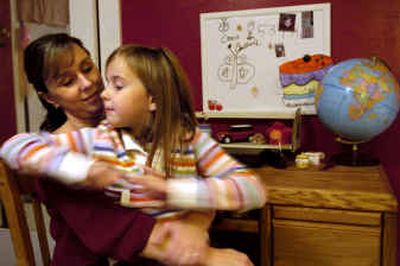Parents want bite of bigger APPLE

The parents involved swear by it.
Grade-school classes are set up where all the parents must give at least 90 hours a year in volunteer time. Their kids flourish under the extra attention from numerous classroom volunteers during the week.
Dozens of similar programs exist across the state. At Spokane Public Schools, the program for about 140 students is called APPLE, which stands for Alternate Parent Participation Learning Experience.
Garfield and Franklin elementary schools offer the program, which draws parents from other schools.
Now supporters of the program at Franklin are pushing to double their numbers in the next several years. The district turned down an expansion proposal last spring, citing concerns over issues such as discussion of closing schools and passing a levy. There was also concern of skewing state funding for low-income and struggling students by changing the funding formula for Franklin.
Spokane Public Schools Superintendent Brian Benzel said he preferred to wait to comment on the matter until hearing from the parents themselves.
“I want to listen to what they have to say,” Benzel said.
Another proposal is heading for the school board tonight.
Nancy Janzen, CEO of a start-up software company, and Dr. Greg Jones, a local physician, will head up the presentation at 7 p.m. at the district’s office, 200 N. Bernard.
If the district won’t support an expansion, Janzen would like a clear answer explaining their reasons.
“We support the district. We are aware the district has excellent schools,” Janzen said. “(But) there are parents who want to be actively involved in their children’s education and this is a program for that.”
As she sees it, what’s not to support?
The volunteers don’t cost the school any money and the program is self-supporting, she said. Almost 20 people are waiting for an open spot for their children.
In the winter, the APPLE program holds a meeting to alert new parents to the program. To get in, parents must attend the meeting and tour a classroom. If there are more kids than open spots, a lottery is held for admission. Those who don’t get in are put on the waiting list.
Each year about six to nine spots open at Franklin, unless someone moves away. Once a family gets in, all of that child’s siblings can join the APPLE program too.
Each of the six grades at Franklin has 12 students in the APPLE program. Classes double up to make a class of 24, so the first grade is paired with the second grade, third with fourth, fifth with sixth.
In previous attempts to expand the program, Janzen said she was told by district officials to wait until a number of things were resolved, such as a pending levy, the possibility of closing elementary schools and a potential impact on state funding for low-income and struggling students. Well, the levy passed, no schools were closed and the funding model changed, Janzen said.
Lori Naylor, an APPLE parent, is in charge of the wait list at Franklin. She’s the one who must tell parents there’s no room for their child.
Naylor has children in the program and was amazed at the environment, which is less structured than standard grade-school classes. She’s watched her own children grow and thrive with APPLE. It’s hard not being able to open the door to new parents who want in, she said.
Holly Ferguson was told this fall that her first-grader wouldn’t be admitted to the program for lack of space. Ferguson comes from a family of educators. Her aunt told her the key to a child’s success in school is parental involvement, but that can be hard for a mother who works a full-time job like Ferguson.
That’s when she heard about APPLE, which requires 90 hours a year but works with parents to be flexible.
“To me it’s a really exciting idea,” Ferguson said. “I’m a believer in public schools.”
She still volunteers her time, but relishes a chance to be in a class where she can join a team of engaged parents.
Last year, the strongest opposition to the Franklin expansion came from a parent who had been rejected for lack of space in the past. The Center for Justice in Spokane also looked into the issue due to concerns that the program seemed to benefit a much higher number of affluent, white students.
That’s a perception, but it’s not true, said Janzen. The makeup of the students at Franklin actually matches the diversity of students at the entire district, she said.
“I respect the challenges the district has. They’re good people. They’re trying to do their job. I understand that. That said, we don’t feel this is a non-issue or something that needs to be shelved for an indefinite period of time,” Janzen said. “I think it’s a timely issue.”